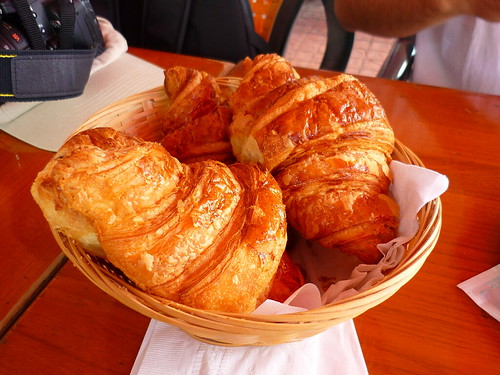The first year I lived in Brussels I would every now and then hear people talk about a city called Aix-la-Chapelle, which I (of course?) just assumed was a place in France until one day I realised that it was a German town! I had never heard of this Aix (on the contrary to Aix-en-Provence in France) and was quite confused but then somebody explained that it was Aachen in French! At about the same time I shocked a French colleague when I admitted to not knowing the difference between Charlemagne and Charleroi – the first one is the French king who I know by the Swedish name Karl den Store (Charles the Great) and the second is a Belgian town (which I nowadays know as the location for the RyanAir airport in Belgium). It isn’t always easy with names of places and persons which are translated differently in different languages.

Buildings at der Markt in Aachen – Germany has Starbucks, unlike Belgium (Burger King doesn’t exist in Belgium either)! I don’t actually miss Starbucks from Puerto Rico…
A few years ago O and I woke up on a Saturday in November and realising that it was a Belgian holiday (11th November is Armistice Day for WWI) we started discussing what to do as everything would be shut in Brussels. O suggested that we go to Maastricht to meet up with my Dutch friend I who lives close by. I thought that it was a perfect idea and called our Swedish friends M and A to ask if they wanted to come along to the Netherlands. When I spoke to M, who hadn’t lived that long in Brussels, she asked “Can you really go to Maastricht just for the day?” – Of course you can, it is less than 120 km away! We had a great day in Maastricht, especially as we discovered that the Dutch do not celebrate Armistice Day by closing shops and businesses, and we said that we should do it more often – that is to go abroad for the day…

A funny fountain in Aachen, the so-called “Puppen brunnen” – the figures and their limbs are moveable so you can change the way they look
And on Sunday we finally did it again, and this time we went to both Germany and the Netherlands! First we had brunch in Aachen with O’s blond brother and his German (as blond as himself) Swedish-speaking girlfriend who were on their way from München to Düsseldorf, and then we went for coffee in the small Dutch town of Heerlen (close to both Aachen and Maastricht) together with Dutch I and her boyfriend.

Aachener Dom (cathedral) in miniature, easier to take a photo of 😉
On our way to Germany via Liège, O asked me to remind him of the name of Liège in Dutch. You see, even if Belgium has more than one official language, the road signs are only bi-lingual in the Brussels area, but as soon as you enter Flanders they are only in Dutch (and in French in Wallonie). In other words, you need to know the names of places in both languages or you might get lost (the time O ended up in Genk instead of Ghent is a classic that we love telling people!!!).

Beautiful mosaic ceiling in the Aachener dom (cathedral)
Liège is a French-speaking Belgian town in the corner of the country bordering Germany and The Netherlands, and it is called Luik in Dutch and Lüttisch in German, further more Aachen is also known, as I mentioned above as Aix-la-Chapelle in French and as Aken in Dutch (and Aquisgrán in Spanish as O’s brother had discovered when he couldn’t find an entry for Aachen in his [Spanish] guidebook for Germany). Phew, lots of names to remember!
It was great to meet up with O’s brother C and his girlfriend G in Germany. As G pointed out – we were finally meeting in her home country after having met in Belgium, Sweden, Puerto Rico and Spain. And she quoted O when she refused to let us pay for the brunch – apparently O had said in Puerto Rico that “you pay when we meet in your country”! Speaking of brunch, Germans really know how to do brunch – 10 EUR per person for a huge all-you-can-eat-brunch-buffet*! We definitely didn’t need to eat anything more before dinner. After the meal we walked around Aachen and visited the beautiful (but surprisingly small) cathedral, which is the burial place of the above-mentioned Charlemagne.

Lucky it was a free buffet and not like in sushi / tapas restaurants where they count how many plates you have eaten!

Aachen is also famous for the cookies called “Aachener Printen”, a sort of Lebkuchen or gingerbread – we didn’t buy any though
**) We always get lost at a fork in the motorway in the Netherlands where I can never remember if we should follow Eindhoven (NL) or Antwerpen (BE). It sounds quite straightforward, of course we should go towards Antwerpen but it isn’t actually the motorway that we are looking for. I just keep forgetting that there is a second split afterwards, for Brussels in one direction and Antwerpen in the other.

I couldn’t resist taking a picture of this! Röv means Ass in Swedish















Recent Comments